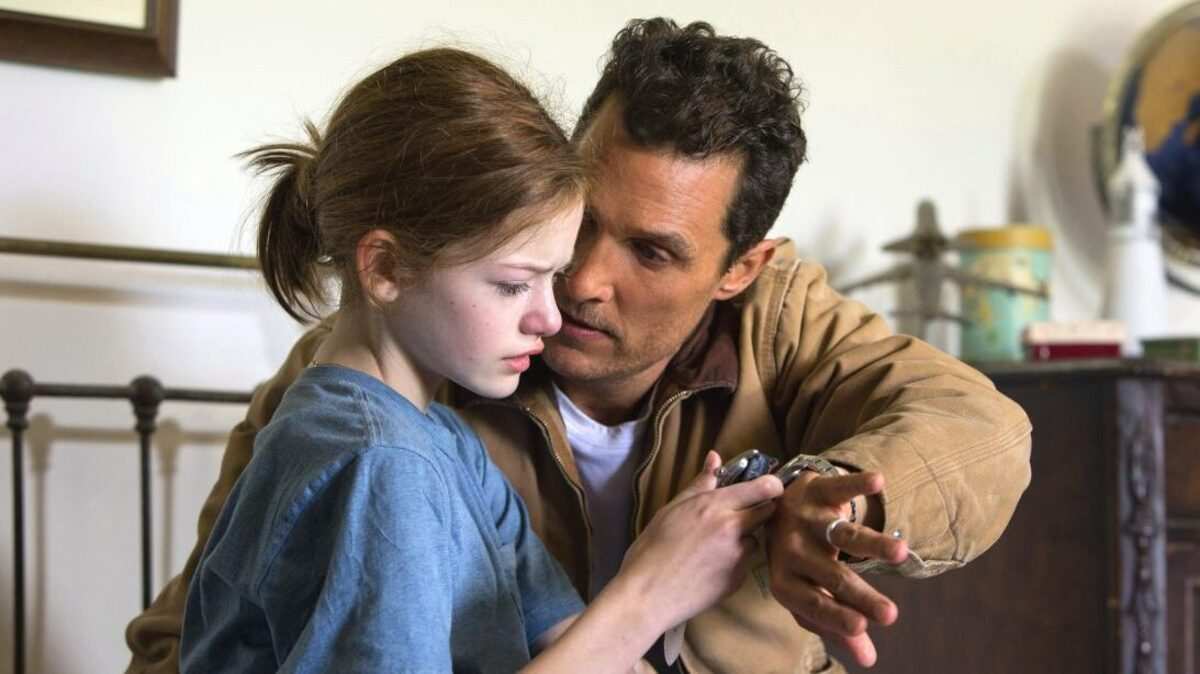“It was me, Murph. I was your ghost.”
Cooper, Interstellar (2014)
In the vast expanse of the cosmos, where stars shimmer like diamonds scattered across an endless canvas, and black holes serve as mysterious portals to other dimensions, humanity has often gazed upon the night sky with a sense of wonder and curiosity. The realm of space has been a backdrop for countless tales of adventure, exploration, and the boundless possibilities of science fiction. Yet, amidst the dazzling spectacle of celestial bodies and the allure of interstellar travel, one film stands apart not just as a space sci-fi epic but as a profound exploration of something even more captivating: the intricate tapestry of love and family.
Christopher Nolan’s “Interstellar” is a masterpiece that defies categorization. It is, undoubtedly, a cinematic marvel that delves deep into the realms of space and science, but at its very heart, it is an emotionally charged journey that transcends the boundaries of time and space to explore the profound relationships that define our humanity. More than just another space odyssey, “Interstellar” is a heart-wrenching ode to the indomitable spirit of love and the intricate bonds of family intimacy.
At its core, “Interstellar” unfurls the story of Cooper (Matthew McConaughey), a former NASA pilot turned farmer, who is compelled to leave his beloved family behind to embark on a perilous mission through a mysterious wormhole in search of a new habitable planet for humanity. This act of sacrifice serves as the initial testament to the depth of his love for his daughter, Murph (Jessica Chastain and Mackenzie Foy). It is in the crucible of this separation, amidst the years of longing and missed opportunities, that the film finds its emotional resonance.
The Father-Daughter Relationship
At the heart of Interstellar lies the profound and emotionally charged relationship between Cooper (Matthew McConaughey), the film’s protagonist, and his daughter, Murph (Jessica Chastain and Mackenzie Foy). Their connection serves as the emotional anchor for the entire narrative, transcending time and space. Cooper, a former NASA pilot turned farmer, is forced to leave his family to embark on a journey through a wormhole in search of a new habitable planet for humanity. This act of sacrifice serves as the first testament to the depth of his love for Murph. It is their separation and the years of longing and missed opportunities that propel the emotional trajectory of the film.
As the story unfolds, it becomes evident that Murph shares her father’s passion for science and exploration. Her brilliance as a child and her unwavering determination to solve the mysteries of the gravitational anomalies on Earth are a direct reflection of her father’s influence. Their intellectual connection transcends time and space, as Cooper communicates with her through gravity itself, sending crucial information from the other side of the galaxy. The film’s emotional pinnacle is reached when Cooper watches decades of messages from his children, bearing witness to the passage of time and the sacrifices they’ve made for him. It’s in these moments that the profoundness of the father-daughter relationship is fully realized, as tears stream down Cooper’s face, mirroring the audience’s sentiment.
The Theme Of Sacrifice
Interstellar underscores the theme of sacrifice as an integral aspect of family intimacy. Cooper’s choice to leave his family for the sake of humanity’s survival is a monumental sacrifice. This theme of sacrifice is further echoed in the choices made by other characters, such as Dr. Mann (Matt Damon) and Dr. Brand (Anne Hathaway), who grapple with their own dilemmas of self-preservation versus the greater good. Murph’s sacrifice is equally profound. She dedicates her life to solving the gravitational equation that will enable humanity’s exodus from Earth, even as she harbors deep-seated resentment toward her father for leaving her. Her enduring love for him, despite their emotional scars, is a testament to the strength of the father-daughter bond.
The Brother-Sister Connection
While the father-daughter relationship is central to Interstellar, the film also explores the dynamic between siblings. Murph’s relationship with her brother, Tom (Casey Affleck), serves as a counterpoint to her relationship with Cooper. Tom, like Murph, struggles with the consequences of their father’s absence. His resentment and initial reluctance to embrace his sister’s endeavors reflect the complex web of emotions within a family. However, as the world deteriorates and the gravity of their situation becomes apparent, the siblings begin to rely on each other. Tom’s transformation from skepticism to solidarity with Murph underscores the film’s exploration of family as a source of strength and resilience.
Final Word
Interstellar, often celebrated for its stunning visual effects and intricate science fiction elements, ultimately transcends the genre by delving into the profound relationships that define the human experience. At its core, the film is a powerful exploration of family intimacy, particularly the father-daughter relationship, with a level of compassion and depth that resonates with audiences on a deeply emotional level. Through the lens of Cooper and Murph’s enduring love and sacrifice, Interstellar reminds us of the bonds that connect us all, even across time and space. It celebrates the resilience of family, the power of love, and the enduring nature of the human spirit. In doing so, Interstellar cements its place not only as a groundbreaking sci-fi epic but as a timeless tale of love, sacrifice, and the enduring intimacy of family.












